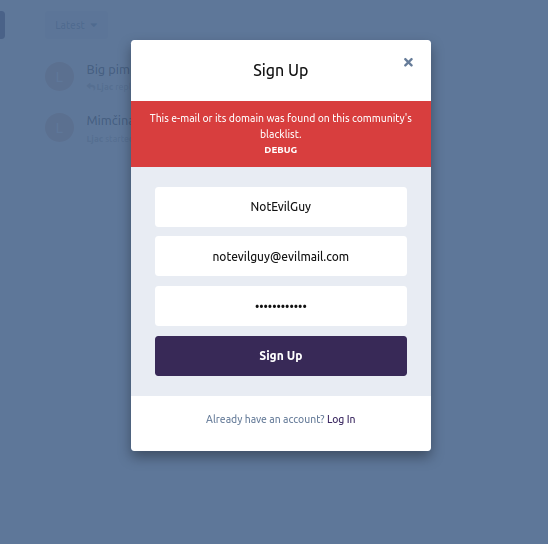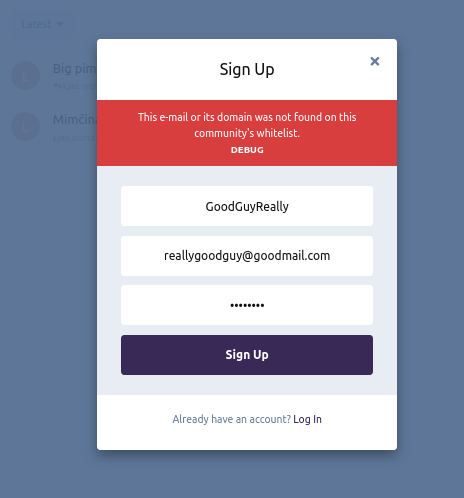studosi / mail-filter
Control what e-mails can register on your Flarum
Installs: 187
Dependents: 0
Suggesters: 0
Security: 0
Stars: 6
Watchers: 1
Forks: 2
Open Issues: 13
Type:flarum-extension
pkg:composer/studosi/mail-filter
Requires
- flarum/core: ^0.1.0-beta.8
- dev-master
- 0.2.0
- v0.1.5
- v0.1.4
- v0.1.3
- v0.1.2
- 0.1.1
- dev-dependabot/npm_and_yarn/js/json5-1.0.2
- dev-dependabot/npm_and_yarn/js/decode-uri-component-0.2.2
- dev-dependabot/npm_and_yarn/js/loader-utils-and-webpack-cli-1.4.2
- dev-dependabot/npm_and_yarn/js/terser-4.8.1
- dev-dependabot/npm_and_yarn/js/ajv-6.12.6
- dev-dependabot/npm_and_yarn/js/path-parse-1.0.7
- dev-dependabot/npm_and_yarn/js/browserslist-4.16.6
- dev-dependabot/npm_and_yarn/js/lodash-4.17.21
- dev-dependabot/npm_and_yarn/js/ssri-6.0.2
- dev-dependabot/npm_and_yarn/js/y18n-4.0.1
- dev-dependabot/npm_and_yarn/js/elliptic-6.5.4
This package is auto-updated.
Last update: 2026-02-05 17:21:28 UTC
README
Mail Filter extension for Flarum - filter e-mail registering by your sites with whitelists, blacklists and regular expression describing both.
Requirements
This extension was built and tested on Flarum 0.1.0-beta12 and PHP7.4. If you are having issues and a different build, please mention that you didn't use the same setup as this (so I know to test it on another environment).
Other than that, there are no prerequisites. It's really a minimal extension.
Installation
Use Bazaar or install manually with composer:
composer require studosi/mail-filter
Updating
composer update studosi/mail-filter
Screenshots
Links
How to use
In the admin panel, there are 4 categories of settings:
- Whitelist
- Whitelist Regular Expressions
- Blacklist
- Blacklist Regular Expressions
Using these settings categories, you can introduce various constraints on who can register for the site - in further text, we'll call these constraints rules.
Whitelist and blacklist
Rules in this category will be explicitly checked if they are the same (using the == operator in PHP).
Regular expression constraints
Rules in this category will be matched using preg_match.
Also, the browser will check if the regular expressions themselves are valid. I am not so well informed on the compatibility between JavaScript's and PHP's regex engines, so this validity check might not work as expected: in that case, submit an Issue.
Basically, these checks check the whole string. This is so you can potentially block certain user names, and not only domains.
Also, one last thing, this takes in regular expressions - languages specific things like prepending and appending a / to a string like in PHP is no necessary (in fact, this extension does it by default, without checking if such a thing already exists).
Example of good regular expression practices
I'll comment in short about some good practices when creating regular expression constraints for e-mails.
Domain limitations
For an example, if you want to filter out gmail emails, you'd introduce a regular expression that goes something like
[^\@]*gmail\.com$
There are a few things to note here.
First of all, you introduce a particle that goes something like [^\@]*. This will ensure that you cover any subdomain. This kind of expression is good for a blacklist (since it is strict).
The second thing to note is the terminated . - this is important to note for beginners because the . is actually an any-character alias in most if not all regex engines, and without a terminator (what we call the \) it can match things like gmailacom, gmaillcom etc. (note the different characters between gmail and com)
The last thing to note is the end-of-string operator ($). You should use it when matching domains since it reduces overhead and is punctual since domains are the last part of an email.
If you're creating expressions for a whitelist, you should use expressions that cover less domains, i.e.
\@gmail\.com$
This is also strict because it will only allow mails that end in @gmail.com to pass through, but not any subdomains of the gmail.com domain you might not know how to handle otherwise.
Username limitations
Let's say you want to filter out e-mail that starts with mark. Doing so is fairly trivial:
^mark[^\@]*
Note again that I'm using a [^\@]* pattern. Also, note that I marked the beginning of an entry with ^. Without that, the regex engine would search the whole string for a match, which is not something you want.
But for an example, let's say you wanted to filter out e-mails that contain the word fuck in them (disregarding where). Then you could just make an entry equal to
fuck
or
[Ff][Uu][Cc][Kk]
which will be case-insensitive (although e-mails, which are URIs, are case insensitive, although I'm not sure if they're normalized by Flarum, would have to check).
Names
Names do not have to be unique - they're used for micro-categorizations and will likely be searchable in the future. Also, they are required by default, not for any functional reason, but for your good. People forget things :)
Activity
Every rule can be activated and deactivated without erasing them. This is done by using the switch left of the rule definition. When the server check if an e-mail is valid, checks for these rules will be skipped.
Order of execution
As of now, the extension will run this:
- check if the e-mail is on an exact blacklist
- if it is, throw a blacklist exception
- check if the e-mail is on a regular expression blacklist
- if it is, set the
blacklistedflag totrue
- if it is, set the
- if the
blacklistedflag is set totrue- check if the e-mail is on an exact whitelist
- if it is, allow registration
- otherwise, throw a blacklist exception
- check if the e-mail is on an exact whitelist
- if the
blacklistedflag is set tofalse- check if both whitelists are empty
- if they are, we presume that the site does not run whitelisting, so we allow registration
- check if we can find the e-mail on either whitelist
- if we can, allow registration, otherwise throw a whitelist exception
- check if both whitelists are empty
In other words, the priority chain is illustrated with this:
blacklist > whitelist > blacklist regular expression > whitelist regular expression
Of course, other priority chains are possible (ex. whitelist > blacklist > whitelist regular expression > blacklist regular expression), and this might be a setting in a future release.
Currently, if the mail passes through the check, the function called validate() will return 0, i.e. it uses C-esque returns. In the future there might be error codes added to the whole thing and exception throws might be completely moved to the extend.php file.
Roadmap
- Introduce a pop-up dialog when attempting to delete a rule
- Make the GUI better looking (less plain HTML)
- Introduce list importing (it's already in the locale files but I don't have time to implement it right now)
- Create a name-based search for each list
- Clean the backend code up (I started JS and PHP programming 3 days ago, give me some slack xD)
About
This plugin was originally written by Yalfoosh. It is a part of the Studoši community - a Croatian education forum run by academic citizens.
If you like it, give it a star :)
All Flarum open source projects by us will have the Apache 2.0 license.
If this is not the case, or you have any other questions or inquiries, make sure to contact us at our e-mail address, or contact Yalfoosh through his semi-business e-mail.



